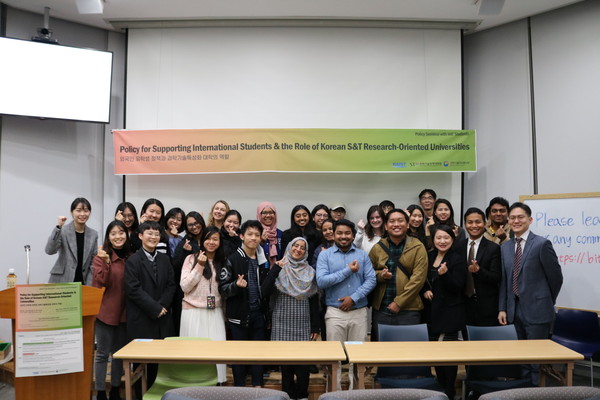On November 15, the Graduate School of Science, Technology, and Policy (STP) held a seminar consisting of presentations covering how to better support international students studying STEM subjects in Korea. Speakers from various affiliations were invited to describe and discuss the existing issues and the actions in the past, present, and future that may be taken to mitigate these problems.
The first presenter was Moon Suk Hong, from the Presidential Committee on New Southern Policy, who introduced the context behind the efforts of South Korea and countries from the Association of Southeast Asian Nations (ASEAN) to create an education system that spans multiple nations, and the difficulties that come with such an endeavor. Hong explained that for the past 20 years, Korea has been cooperating with ASEAN nations concerning education systems. While this was initially to provide education and support to developing countries, from 2010, the relationship has shifted into a collaboration. Currently, ASEAN countries along with China, Korea, and Japan (ASEAN +3), have been involved in reframing education to span multiple nations. While several programs have been introduced in this context, the inevitable internationalization and neo-liberalization of higher education call for a new, systematic, and unified approach.

Heejin Lim, a research professor from the Korea National University of Education, highlighted the increase in the number of international students in Korea, with more than a tenfold jump since 2003 according to an OECD report. She noted that attracting international students brings increased revenue through tuition and tourism, introduces foreign talents, and increases the global competitiveness of universities. This provides a solution to several important contemporary issues facing Korea, such as brain drain, and school-age population decline. However, these students still face a number of challenges, including limited opportunities to participate in various scholarly activities, inconsistent educational backgrounds, language barriers, and information asymmetry concerning post-grad career paths. Furthermore, there is still much to consider when attracting established talents vs. potential talents, as well as the different pathways through which students enter Korea depending on the degree level.
Cheol-Woo Oh, a retired journalist and current lecturer at Seoul National University of Science & Technology, focused mainly on the results of research involving more than 1,000 international students in Korea. In agreement with the previous presentation, the results indicated that while post-grad education, research environments, and funding were favorable, cultural and language barriers, and workload were major difficulties. Furthermore, there were many cases of communication within labs being problematic, with the majority of laboratory meetings and discussions being conducted in Korean.
In the second section, Joeffrey Climag, the President of the Council of ASEAN Professors in Korea, Minji Kim from UNIST International Office, and Sourav Sarkar, the President of Graduate Student Association in POSTECH, provided further personal insights into the issues that international students face in Korea. Notable comments were on the disparity between student expectations and what the university provides (e.g. a lack of financial assistance, low English proficiency of professors), cultural differences (e.g. Halal food), and more statistics on the issues that plague Korea (e.g. school-age population decline) and international students (e.g. high working hours).
The closing remarks of the event emphasized that while the session was productive, more discussions must be conducted to fully understand these issues and to provide comprehensive solutions.

